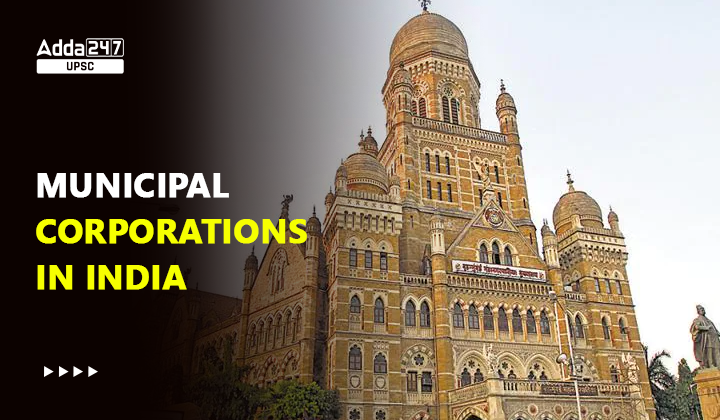Table of Contents
Municipal Corporations in India: In India, the Municipal Corporation serves as the urban local government responsible for overseeing the development and administration of Metropolitan Cities with populations exceeding one million people. It is known by various names such as Mahanagar Palika, Nagar Palika, Nagar Nigam, and City Corporation. The Municipal Corporation in India plays a vital role in managing the affairs of these large urban centers and ensuring their growth and well-being.
First Municipal Corporations in India
First Municipal Corporations in India: In 2011, the government put forth a proposal to divide the Municipal Corporation of Delhi (MCD) into three separate entities to enhance operational efficiency. Subsequently, the Ministry of Home Affairs approved the proposal in November 2011. In response, the Delhi government held a special assembly session and passed the Delhi Municipal Corporation (Amendment) Bill in December 2011.
The official notification for the trifurcation was issued in January 2012, leading to the establishment of North, South, and East Delhi municipal bodies. The first two bodies, North and South Delhi, were allocated 104 wards each, while the East Delhi body received 64 wards. This division aimed to streamline governance and administration in the respective regions of the capital city.
Financial Status of Municipal Corporations in India
- In India, the own tax revenue of municipal corporations, comprising property tax, water tax, toll tax, and other local taxes, formed 31-34% of the total revenue in the FY18-FY20 period.
– This share was low compared to many other countries and it also declined over time.
- Using budgetary data from 201 municipal corporations across India, the RBI report calculated their overall revenue receipts — consisting of their own tax revenue, own non-tax revenue, and transfers.
- In 2017-18 (actuals), it was estimated to be 0.61% of the GDP and according to budget estimates of 2019-20, it increased slightly to 0.72% of the GDP.
- This was much smaller than Brazil’s 7% and South Africa’s 6%.
- Large variations can be observed if the municipal corporations’ own tax revenue is sliced State-wise.
- The own tax revenue of municipal corporations as a share of the State’s GDP in 2017-18 crossed the 1% mark in Delhi, Gujarat, Chandigarh, Maharashtra, and Chhattisgarh, while it was 0.1% or less in Karnataka, Goa, Assam, and Sikkim.
- Despite such dominance, property tax collection in India was much lower compared to OECD countries due to undervaluation, and poor administration, the report argues.
- Over 70% was spent on revenue expenditures such as salaries/wages/bonuses (25%), operational and maintenance charges (16.2%), pensions (7.4%), etc., while less than 30% was capital expenditure.
Challenges Faced by Municipal Corporations in India
- The study titled “Report on municipal finances” reveals how municipal bodies are increasingly dependent on fund transfers from the State and the Centre, while their revenue-earning capacity is limited.
- Their revenue-raising powers are curtailed, the study shows. Limited funds aside, about 70% of it gets spent on salaries, pensions, and administrative expenses with the rest left for capital expenditure.
- And above all, municipal corporations don’t borrow much, leaving them gasping for funds.
- Taxes earned by municipal corporations in India are grossly inadequate to meet their expenditure needs.
- The share of own revenue (both tax and non-tax) in the total revenue of urban local bodies in India has declined, while that of government transfers has increased.
- Another major issue with the municipal corporations’ revenue-raising capabilities was their dependence on property taxes.
- In 2017-18, property taxes formed over 40% of the municipal corporations’ own tax revenue.
- A report published in the Chennai edition of this paper on Monday further highlights the problems plaguing property tax collection.
- Of the 13.27 lakh assesses in Chennai, only 6.94 lahks paid the property tax, while 6.33 lakh were yet to pay. The shortage of tax collectors has further impacted the revenues.
- Property tax was collected in ₹ crores in FY18, FY19, and FY20 across major cities. Most of the major cities have managed to increase their property taxes in the period, though increasing urbanization rate and rising population density may have played a role.
Municipal Corporations in India Constitutional Provisions
In the original Constitution of India, there was no specific provision for the establishment of local self-government, except for Article 40 in the Directive Principles of State Policy, which emphasized the need for organizing village panchayats and endowing them with necessary powers.
However, the 74th Amendment Act of 1992 brought significant changes by inserting a new Part IX-A into the Constitution. This part focuses on the administration of Municipalities and Nagar Palikas, and it comprises Articles 243P to 243ZG.
The 74th Amendment Act also introduced a new twelfth schedule to the Constitution, consisting of 18 items. This schedule enumerates various functional areas that are within the purview of Municipalities to provide effective governance and public services at the local level.
Municipal corporations in India for UPSC
Municipal corporations in India are a local form of government in Urban Areas. Municipal corporations were established under the 74th Constitutional Amendment Act. Municipal corporations are also important for UPSC Prelims 2023 and UPSC Mains Exam (GS Paper 2- Local Government in India).

| Relatable Articles | |
| Emergency in India | center-state Relations |
| Special Provisions Act | Cooperative Societies |



 TSPSC Group 1 Question Paper 2024, Downl...
TSPSC Group 1 Question Paper 2024, Downl...
 TSPSC Group 1 Answer key 2024 Out, Downl...
TSPSC Group 1 Answer key 2024 Out, Downl...
 UPSC Prelims 2024 Question Paper, Downlo...
UPSC Prelims 2024 Question Paper, Downlo...





